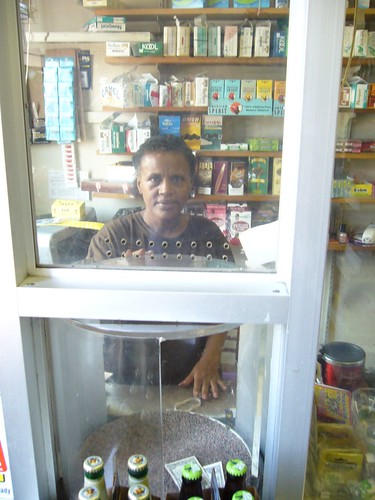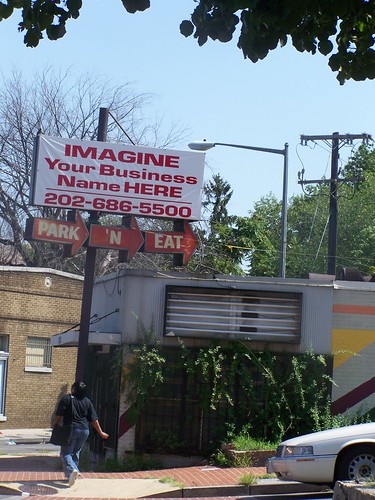Commerz in the 'hood revisited: Asian slurs edition
 Flickr image from Old Anacostia.
Flickr image from Old Anacostia.In 2006, I wrote a series of entries on the topic of commerce in inner city neighborhoods, sparked by a series of articles in the Washington Post that lamented neighborhood change, while one of the articles focused on animus in the H Street neighborhood over ANC6A's use of the zoning code's definition of fast food restaurants (such establishments require a "special exception" to open, they are not matter of right uses) to attempt to prevent their opening.
- Commerz in the 'hood... (aka "Commerce as the engine of urbanism")
- Commerz in the 'hood, part two
- Commerz in the 'hood, part three
This was in "part two":
The Post article, "Whose H Street Is It, Anyway? A Dispute Over Restaurant Zoning Creates a Chasm Between Northeast Washington's Old and New Residents," continues to be heatedly discussed on neighborhood e-lists.
The owner of H Street Martini Lounge, is now backpedaling, and says that the quotes are taken out of context and that the writer had predetermined the story angle. He was quoted in the article thusly:
The ANC, which became majority white in 2002, wants to push "the African-Americans from the corridor," said Clifton Humphries, owner of the H Street Martini Lounge, who is black. "They're trying to steer what comes down here. They want an upscale environment, where they are comfortable around their own."
This from a guy selling $10+ martinis!
Anwar Saleem, chair of H Street Main Street, said this in the article:
Anwar Saleem, chairman of H Street Main Street, a coalition of merchants and residents, said he at first was unenthusiastic about Cluck-U because he hoped for a restaurant with linen tablecloths or a clothing store. But the ANC's opposition has turned Saleem into one of Cluck-U's steadfast supporters. He applauded Gibson for keeping his place clean and trying to appease commissioners by providing sit-down patrons with non-disposable plates and flatware.
"It's unnecessary," Saleem said of the ANC's challenge. He questioned whether the commission is trying to "discriminate against minority-owned businesses. I wouldn't be surprised if they go after the beauty shops, the shoe stores and the clothing stores."
And in January I revisted the topic in "More on Commerz in the 'hood," because some African-American owned businesses on H Street, hurting financially because of the double whammy of the recession plus the business-reducing effects from the reconstruction of H Street, while seeking financial assistance, made it into a race issue, claiming that white-owned businesses were helped during this period, at their expense.
This comes up because of the lighting up of the media because of Councilman Marion Barry's complaint about Asian-American owned businesses in his ward/poor areas of the city as "We’ve got to do something about these Asians coming in, opening up businesses, those dirty shops. They ought to go, I’ll just say that right now, you know. But we need African-American businesspeople to be able to take their places, too," according to WRC-TV and recounted in "Marion Barry apologizes for anti-Asian remarks" in the Post. But the apology included this:
But Barry renewed his critique of Asian-owned businesses: “Let me make it clear, I’m not castigating any group of people. I’m not doing anything except trying to have a renaissance of our community and get some respect. A number of these restaurants serve high caloric food, bad food, et cetera, but the more important thing, they don’t participate in the community. . . . That’s what I object to, I don’t care who it is. “
Asked why he singled out Asians in his remarks, Barry said, “Because that’s reality. Who owns these little restaurants? Who owns them? You know, Asians. . .Ninety percent of all the small restaurants in Ward 8, at least.” It is difficult to verify that claim.
African-American resentment about Asian-owned businesses is nothing new. People ought to remember the boycotts in the 1980s over such businesses in New York City. See this piece, "Review/Television; The Boycotting of a Korean Grocery in Brooklyn" from the New York Times of an episode of the tv news show, "48 Hours," on the topic. It even made it in as a recurring theme on episodes of the television show "Hill Street Blues," which ran from 1981 to 1987.
And Andrew Young lost his job of greasing Walmart's entry into inner-city markets in 2006 for making remarks not unlike Marion Barry, as recounted in this piece "Andrew Young resigns from Wal-Mart group: Civil rights leader hired to burnish retailer's image under fire for remarks," from MSNBC:
In the Sentinel interview, Young was asked about whether he was concerned Wal-Mart causes smaller, mom-and-pop stores to close.
"Well, I think they should; they ran the `mom and pop' stores out of my neighborhood," the paper quoted Young as saying. "But you see, those are the people who have been overcharging us selling us stale bread and bad meat and wilted vegetables. And they sold out and moved to Florida. I think they've ripped off our communities enough. First it was Jews, then it was Koreans and now it's Arabs; very few black people own these stores."
The issue is important but we need to look at what's going on. First, it's not like African-Americans haven't owned stores in neighborhoods, but there has been a long period, co-incident with the outmigration of middle-class African-Americans from the inner city, where they sold their businesses.
Second, it's true that stores in inner-city neighborhoods, especially those extremely impoverished, can be second-rate.

Plexiglass barrier in a store in the 14th and U Street NW neighborhood. Flickr image by niawag.
It's a function of low profits, partly because of low revenues, but also because of "shrink," the impact of theft of goods--which is why some stores have everything, not just the clerk, but the stock also, behind plexiglass.

Empty storefront on Martin Luther King Ave. SE, Washington, DC.
The resentment as expressed by Councilman Barry is the function of two things.
(2) The other is resentment over changes in the city, which "west" of the river, comparatively speaking, is booming--adding restaurants and businesses and population ("District's population and image soar" from the Post and "Home is where the Hardware Store is" from the Washington City Paper)--despite the recession, while Wards 7 and 8 continue to languish.
Addressing this problem is tricky as it is a function of the relative positions within the market. If you want better businesses, the microeconomies of the respective neighborhoods need to be stronger. In a market economy, that means adding more residents with more income. And that kind of change is resented as well.
See the past blog entry "Revitalization in stages: Anacostia" which could also be considered yet another entry in the "commerz' in the 'hood" series. From that piece:
The Post has another story on Anacostia, "Black professionals leading the charge of gentrification across Anacostia." With regard to the thesis as expressed in the headline, again I think it's important to think about "gentrification" in a more nuanced fashion than what typically occurs. From the article:
“I used to think it was about race — when white people moved into a black neighborhood,” said lawyer Charles Wilson, 35, president of the Historic Anacostia Block Association. (Wilson ran against Marion S. Barry Jr. in the 2008 Ward 8 City Council race.) “Then, I looked up the word. It’s when a middle-class person moves into a poor neighborhood, and I realized, I am a gentrifier. I couldn’t believe it. I don’t like that word. It makes so many people uncomfortable. The g-word.”
Of course gentrification is about money, not race, it's just that in the U.S., too many people think that people of color are usually poor and that's not the way it is.
---
Sadly, neighborhoods usually improve through the in-migration of people with money and the displacement/outmigration of people without money.
Labels: commercial district revitalization, electoral politics and influence, gentrification, invasion-succession theory, neighborhood change, neighborhood planning, restaurants, urban revitalization



0 Comments:
Post a Comment
<< Home